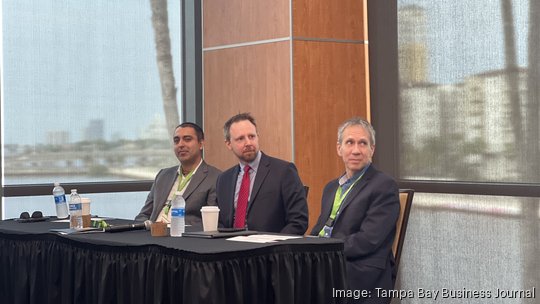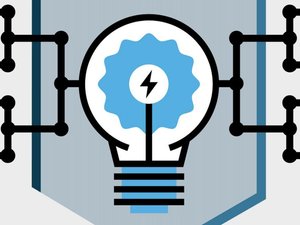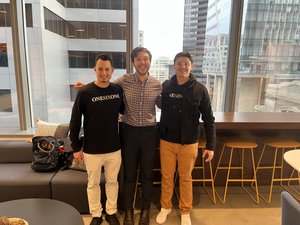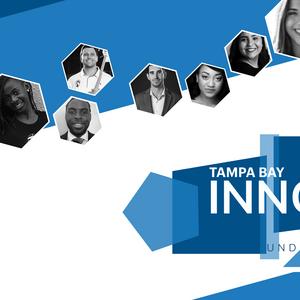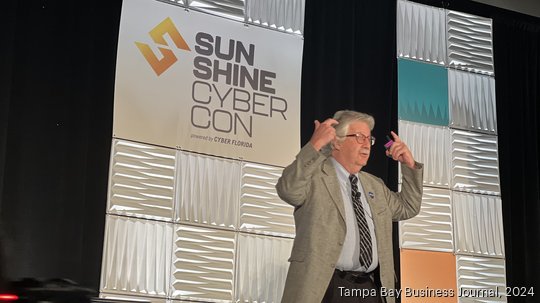
The speakers and panelists of Tampa's Sunshine Cyber Conference proved a point: The future of artificial intelligence and cybersecurity are intertwined.
The conference — hosted by Cyber Florida, a statewide cybersecurity organization housed at the University of South Florida — kicked off March 25. Officials from across the state and industries spoke on panels at the Tampa Convention Center and discussed broad trends in the cybersecurity space. Conversations on AI and the implications of emerging technology dominated the event.
As Tampa has become a hub for cybersecurity through companies like ReliaQuest, KnowBe4 (an event sponsor) and Rapid7, the conference also shared an insight into future challenges for the state's business and technology ecosystem.
How AI is changing cybersecurity
Two keynote speakers — and many others at the event — urged caution and skepticism around AI technology to improve cybersecurity measures.
Winn Schwartau, a leader for a division of Clearwater-based KnowBe4 and a public speaker, discussed the addictive qualities of technology like social media and virtual reality headsets.
Schwartau said society may be heading toward a point where one’s "consensual hallucination" through technology is no longer distinguishable from reality.
People’s perception of reality will become subject to external influence as technologies like the Metaverse combine with AI, he said. Generative AI information and hyperrealistic media will be difficult to verify, and all content will require a new level of scrutiny, he told the audience. Then, this cycle of disinformation and dependence on technology will be difficult to break because of the chemical reactions it causes in the human brain.
That means cybersecurity and hacking now include the physical elements of one’s body and life, he said.
“Our cybersecurity job now has a new attack surface,” Schwartau said in his presentation. “That is what you are going to have to learn how to defend if you're going to stay in cybersecurity.”
One solution is a U.S. Air Force combat idea, Schwartau said. The concept, called “OODA loops,” is a technique to understand and interpret an opponent’s objectives psychologically. By predicting and envisioning an entity's intentions, individuals might be able to better identify AI-fueled misinformation.
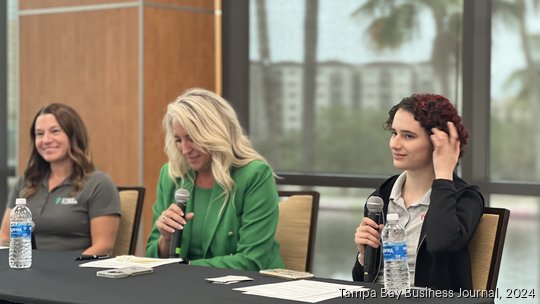
Another keynote speaker, Bianca Lewis, is a 17-year-old entrepreneur and cybersecurity advocate. She founded the nonprofit Girls Who Hack, which seeks to help educate girls on cybersecurity.
Lewis spoke about AI becoming a source of mass misinformation in the 2024 election cycle. Her solution is also using intense scrutiny.
“Be skeptical of everything — because anything can be true or untrue,” Lewis said in a panel.
Her advice is to look for adjectives in writing as a sign of biased and propaganda-like information.
Higher education, Florida Legislature intersect with cybersecurity and AI
State officials also discussed at the conference how they seek to figure out AI's place in cybersecurity. In fact, Cyber Florida is a state-funded initiative enacted by the Florida Legislature in 2014 to develop the state’s cybersecurity workforce and support job creation.
At the conference, three panelists discussed the intersection of government and AI and how these trends might play out in the state's future.
Jeremy Rodgers, Florida's chief information security officer, said the issue with AI in cybersecurity protocols at the state level is problematic when people follow an AI tool's decisions. It's OK to use generative AI as a support function, but its decisions shouldn't be final, he told the audience.
"If you're executing, whether implicitly or explicitly, say, 'Oh, this is what it said to do, let's do it,' you may have lowered the quality of service you're doing and introduced all kinds of security issues," Rodgers said.
Dr. Sagar Samtani, an AI expert and assistant professor at Indiana University, agreed that deference to AI chatbots is a primary ethical issue. Florida also has no legislative policy on AI, as the panelists discussed. But that question will be solved in the future, Samtani said.
"It's OK that Florida doesn't have its own AI policy yet," Samtani said. "A lot of those policies are actually coming from the AI EU Act, for instance — federal-level stuff that's going to come down and drip down to the different states and give guidance on how we can actually ascertain and appraise AI in different types of contexts."
The panelists agreed that another AI issue in the state is the role of higher education. Colleges are urgently trying to meet demand in technology careers and implement AI tools into campuses.
Many schools are "fast-tracking" AI and cybersecurity curricula on campus to catch up with demand, said Eman El-Sheikh, a vice president at the University of West Florida Center for Cybersecurity. They're also seeking to merge the fields into cohesive educational programs, Samtani said.
